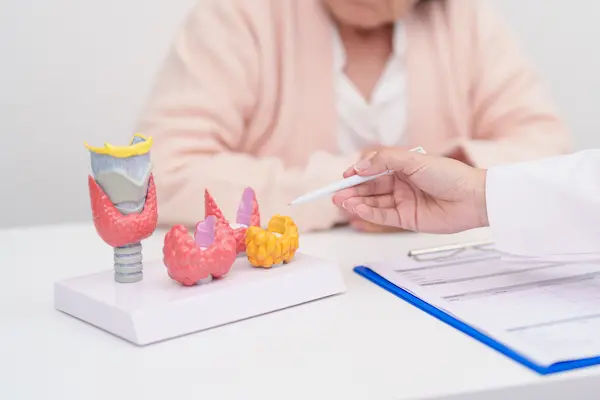- female
- 30 Years
- 31/03/2021
What is a normal TSH level for a pregnant woman?
More Endocrinology Health Queries
View allCan you help me understand my post-radioiodine whole body scan results after surgery for papillary carcinoma I'm a bit worried about what the findings might mean
A post-radioiodine (RAI) whole body scan is used after surgery for papillary thyroid cancer to assess for any remaining thyroid tissue or cancer cells that may not be completely removed during surgery. The scan uses a small dose of radioactive iodine to detect these cells, and the results help determine the need for further RAI treatment
Answered by 1 Apollo Doctors
Can someone be misdiagnosed with type 1 diabetes?
It is commonly misdiagnosed in adults.A study found that 38% of type 1 diabetes patients diagnosed over age 30 were misdiagnosed with type 2 diabetes and did not receive the required insulin.
Answered by 1 Apollo Doctors
What are the success chances when transferring a grade 2 embryo? I've got three of these, each being a grade 2 on day 3. Could you also explain how the grading works and what my chances of conceiving might be?
The success chances of a grade 2 embryo transfer are relatively good, considering day 3 embryo grades are categorized into four quality levels. - Grade 1 (poor quality): More than 25% fragmentation - Grade 2 (fair quality): 10-25% fragmentation - Grade 3 (good quality): 1-10% fragmentation - Grade 4 (excellent quality): Less than 1% fragmentation Studies have shown that embryos across all grades can lead to healthy births, but higher-quality embryos have better success rates. For day 3 embryos, the success rates are generally lower compared to blastocyst-stage embryos. To give you a better idea, here are some general success rates for embryo transfers based on the embryo's quality and stage of development : - Excellent-grade blastocysts: 65% pregnancy rate and 50% live birth rate - Good-grade blastocysts: 59.3% pregnancy rate and 49.7% live birth rate - Average-grade blastocysts: 50.3% pregnancy rate and 42.3% live birth rate - Poor-grade blastocysts: 33.3% pregnancy rate and 25% live birth rate Keep in mind that these are general estimates and actual success rates can vary depending on individual circumstances and the specific fertility clinic. Given that you have three grade 2 embryos, your chances of conceiving are still relatively good, but it's essential to consult with your fertility specialist to discuss the best course of action and determine the most suitable embryo transfer strategy for your specific situation.
Answered by 1 Apollo Doctors
Disclaimer: Answers on Apollo 247 are not intended to replace your doctor advice. Always seek help of a professional doctor in case of an medical emergency or ailment.




